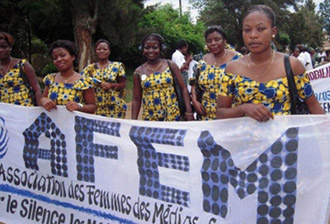New York, September 11, 2009—Authorities in the Democratic Republic of Congo must aggressively investigate threats made against three radio reporters in the eastern city of Bukavu in the Democratic Republic of Congo, the Committee to Protect Journalists said today.
Delphie Namuto and Caddy Adzuba of U.N.-sponsored broadcasting network Radio Okapi and Jolly Kamuntu of local station Radio Maendeleo were named in an anonymous text message sent on Tuesday to Namuto: “You have a bad habit of interfering in what does not concern you to show that you are untouchable. Now, some of you will die so that you shut up We’ve just been authorized to start with Kadi, then Kamuntu, then Namuto: a bullet to the head.”
The threats come against a backdrop of increasing violence and intimidation—just two weeks after the murder of journalist Bruno Koko Chirambiza, the second radio reporter killed in this volatile city in 27 months, according to CPJ research.
Adzuba said she has received four menacing calls. She said she believed the caller has been tracking her movements using a masked number. On Thursday, she picked up a call from a local number. The caller said nothing, but held up the phone so she could hear the live radio broadcast of her station, she said. The threats have not been linked to any specific news item, according to Jacqueline Chenard, bureau chief of Radio Okapi in Bukavu.
Speaking with CPJ on Thursday, Bukavu police superintendent Col. Christian Shadiki Shamavu said he was not aware of the threats but would talk to the journalists. Shamavu told CPJ that the area has had a proliferation of armed groups circulating at night. The South Kivu’s Association of Women Journalists (AFEM), the Congolese National Press Union, and the Network of Radio and Television Broadcasters of eastern Congo known as RATECO planned to file a complaint on Saturday, according to local journalists.
“Bukavu has become one of the most dangerous cities for journalists in Africa,” CPJ Africa Program Coordinator Tom Rhodes. “Authorities must do everything in their power to protect these journalists and end a long pattern of violence and intimidation against the press.”
Kamuntu, who heads AFEM, produces a weekly program called “Sheria Ni Dawa” (Justice is a Remedy), which is broadcast on 35 stations in eastern Congo. The program has covered sexual violence issues since June, she said.
“Radio Okapi journalists, like other journalists in Bukavu, do not feel safe because of persistent insecurity. It’s not only journalists, but also human rights defenders who are targeted,” said Chenard of Radio Okapi’s bureau in Bukavu.
